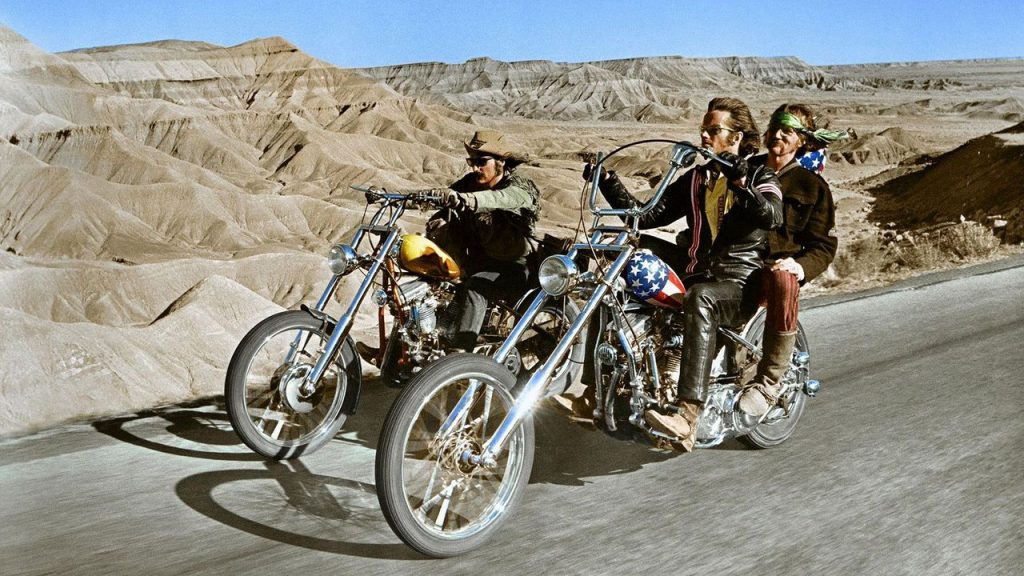Easy Rider: A Game-Changer in Hollywood’s Cinematic Landscape
4 min read
Peter Fonda and Dennis Hopper in Easy Rider. Photograph: Allstar/Columbia/Sportsphoto Ltd/Allstar

Peter Fonda and Dennis Hopper in Easy Rider. Photograph: Allstar/Columbia/Sportsphoto Ltd/Allstar
Released on October 17, 1969, Easy Rider emerged as a cultural milestone, showcasing the rebellious spirit of the late 1960s through its bold themes and guerrilla filmmaking techniques. Infused with rock music, free love, and the burgeoning counterculture, the film resonates with social tensions of the era, transforming how stories were told in Hollywood.
Directed by Dennis Hopper, who also stars as the free-spirited biker Billy, and produced by Peter Fonda, who plays Wyatt, Easy Rider begins with the duo smuggling cocaine from Mexico to sell in Los Angeles. Flush with cash, they set off on a cross-country journey to New Orleans for Mardi Gras. Their road trip is underscored by Steppenwolf’s iconic “Born to Be Wild,” providing a soundtrack to their encounters with various characters reflecting the conflicting worldviews of America at that time. The film presents a fragmented portrait of a nation grappling with change, epitomized by its tagline: “A man went looking for America. And couldn’t find it anywhere…”
A month before the film’s release, Hopper sat down with the BBC’s Philip Jenkinson for an interview that mirrored the film’s own chaotic nature. Dressed similarly to his character, Hopper’s responses were intriguing yet erratic, reflecting the tumultuous 1960s—a decade defined by the civil rights movement, escalating anti-war protests, and shocking political assassinations. He expressed frustration that mainstream cinema failed to capture the hopes and fears of young Americans. “There was nothing that spoke directly to these young people,” he lamented, highlighting the gap between generations.
Hopper aimed to create a film that directly addressed the realities of contemporary America, arguing that Hollywood had largely ignored the pressing issues of the time. “Very few people go out and make a movie about that, especially in Hollywood,” he remarked. This vision made Easy Rider not only unconventional in subject matter but revolutionary in its production style.
With a meager budget of $400,000 from Columbia Pictures, the film adopted a DIY ethos. In pursuit of authenticity, Hopper opted for real locations over costly studio sets, employing handheld cameras and natural light to evoke a genuine feel. Cinematographer László Kovács mounted a camera on a Chevy Impala convertible, capturing the bikers as they rode through stunning American landscapes. This innovative approach allowed the film to embody the sense of freedom and possibility that the road symbolizes.
However, the production was fraught with challenges, not least due to Hopper’s volatile nature. Known for his clashes with directors, he faced struggles in asserting creative control. At one point, he physically confronted a camera operator over footage. Actor Rip Torn was originally cast in Nicholson’s role but left after a fight with Hopper, which later led to legal battles over conflicting accounts of the incident.
Despite these challenges, Hopper took his craft seriously, committed to authenticity. He often immersed himself and his co-stars in the lifestyle depicted in the film, with Nicholson famously recalling how he “smoked about 155 joints” during the shooting. This level of commitment to realism—combined with the dismantling of the Hays Code in 1968—allowed Easy Rider to portray drug use without the stigma that previously accompanied it.
The film’s candid depiction of drug use and its unvarnished look at American society drew both admiration and criticism. Hopper defended these elements, arguing that it would be unrealistic for characters like Billy and Wyatt to not engage with drugs. The film does not glorify its protagonists but instead presents them as reflections of a society in turmoil, highlighting the brutal reality faced by those deemed outsiders.
Easy Rider resonated with a generation of disillusioned youth, quickly becoming a critical and commercial success. Despite its initial limited release, it grossed over $60 million worldwide and earned accolades, including the First Film Award at Cannes and Oscar nominations for Nicholson and the screenplay.
The success of Easy Rider blindsided Hollywood, leading to a paradigm shift in the industry. Its grassroots success paved the way for a new wave of filmmakers like Martin Scorsese, Francis Ford Coppola, and Steven Spielberg, who were given greater creative freedom to experiment. This new era would come to define American cinema throughout the 1970s.
As for Hopper, he remained ambivalent about his newfound acceptance in Hollywood. “It’s like you are on an elastic band,” he remarked, observing how the industry often embraced talent only to discard it when no longer useful. Yet Easy Rider firmly established his legacy as a revolutionary figure in cinema, forever altering the landscape of American filmmaking.